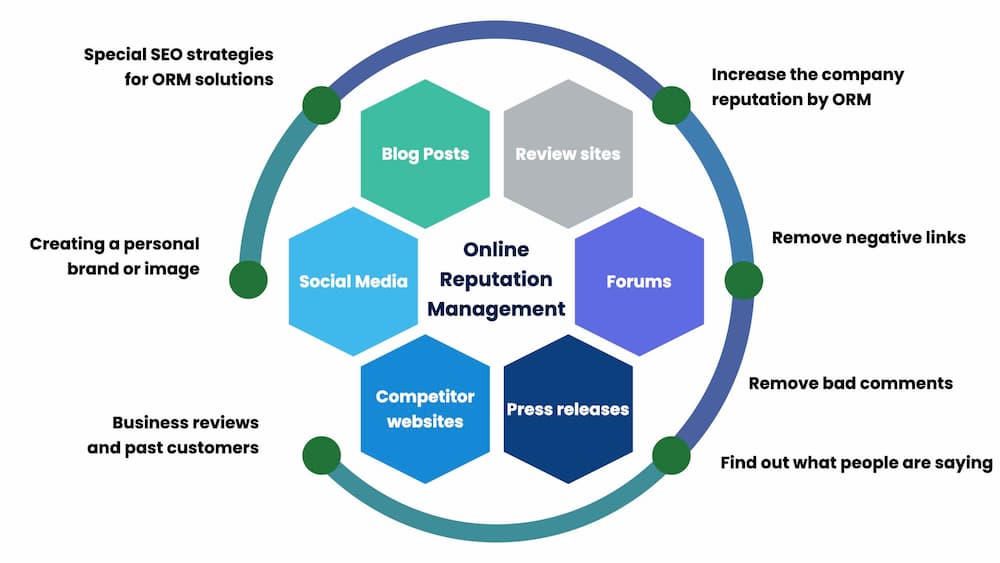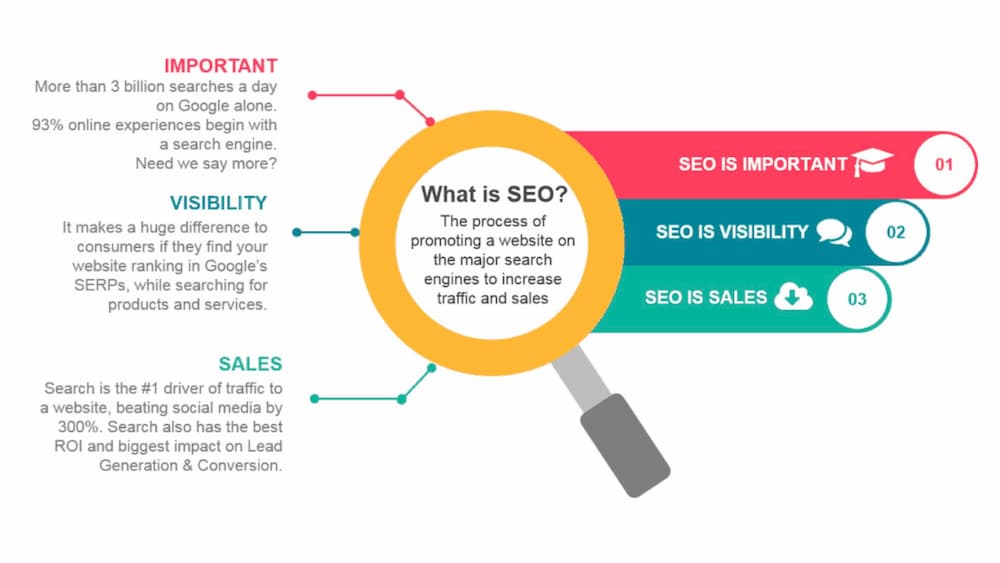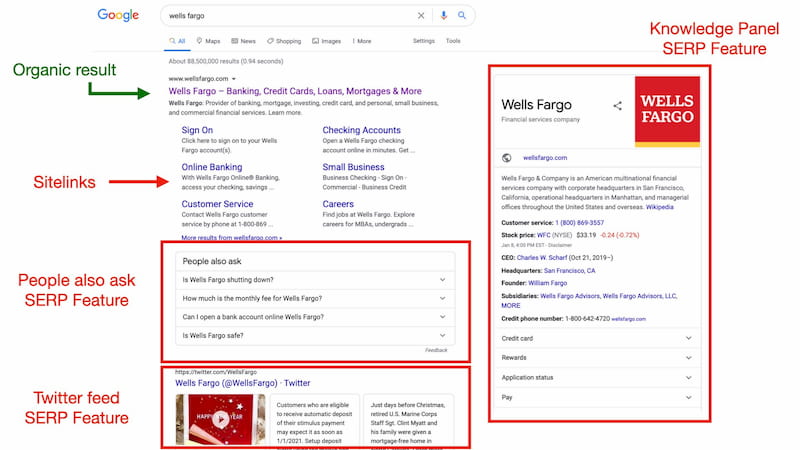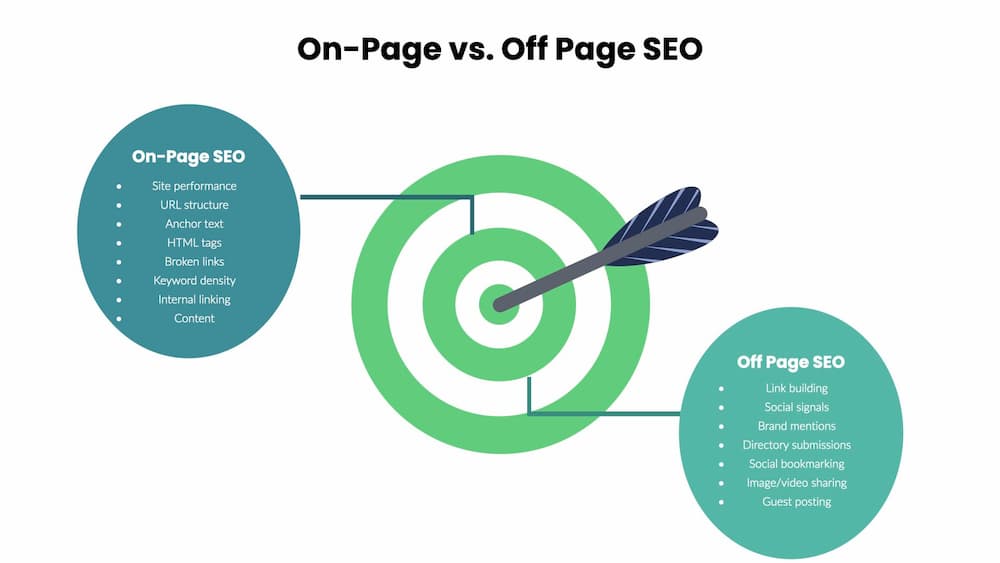SEO Reputation Management Overview

SEO Reputation Management helps businesses control search results by suppressing negatives and amplifying positive content. This guide will show you step-by-step how to improve your online reputation with SEO strategies.
Jump to a Section
- How Does Reputation Management Work?
- How Does Online Reputation Management Affect Search Engine Results?
- What is SEO and How Does it Work?
- Using SEO for Reputation Management
- SEO Reputation Management Checklist
- SEO Reputation Management FAQs
Protecting, managing, and recovering your brand reputation comes down to focusing on what you can control.
It starts with being aware of what people say about your brand, taking responsibility and corrective action to solve any problems, and then working to recover from the damage by addressing your SEO reputation management.
SEO reputation management utilizes various techniques to shape and improve a brand’s reputation and standing in SERPs. The goal is to minimize the visibility of negative content while promoting positive brand mentions, reviews, and authoritative web properties.
Specific SEO reputation management tactics include:
- Optimizing and updating online profiles and websites to showcase positive brand attributes. This enables a brand to put its best foot forward online.
- Producing high-quality content that portrays the brand positively and establishes thought leadership. Useful, engaging content can improve search rankings.
- Securing positive reviews and testimonials across credible third-party sites to counterbalance negative feedback.
- Monitoring online conversations about the brand and responding appropriately to reputational threats or feedback.
- Using media relations and outreach strategies to obtain positive press mentions. These can significantly influence brand perception.
- Leveraging search advertising and social media campaigns to increase positive visibility.
- Addressing damaging content like negative reviews or scam alerts through solutions like deindexing or suppression.
Expert ORM agencies have the experience and comprehensive toolkit to execute multifaceted reputation management campaigns. For brands struggling with reputation issues, hiring a qualified SEO reputation management agency can facilitate faster recovery and help regain lost trust.
Ultimately, vigilant monitoring, responsiveness, and a strategic approach are vital in protecting, managing, and, when necessary, repairing a brand’s online reputation.
SEO reputation management provides the framework to accomplish this effectively.
How Does SEO Reputation Management Work?
You can’t control everything that’s said about your business’ reputation. Inevitably, there will be a consumer, employee, or partner who says or does something that makes you look bad or even causes a company crisis. Or maybe you’ll even make some company decisions that come back to haunt you.
The embarrassment will be bad enough on its own, but what’s more hurtful is:
- The damage to your brand value and brand equity
- The loss of customers
- The loss of ROI
- The loss of stock value
- Increased expenses
Reputation management can help you avoid reputation crises and remedy them if they occur.

Proactive reputation management can help you monitor, cultivate, and, when necessary, repair your brand’s reputation. Here’s a look at how it works:
- Listening and Monitoring: The first step is listening to conversations about your brand on review sites, social media, forums, and other platforms. Monitoring tools can track mentions and alert you to potential issues. This enables you to respond quickly.
- Promoting Positive Content: You want search results pages to showcase authoritative, positive brand content. An SEO and content strategy highlighting company news, leadership, awards, media coverage, thought leadership articles and customer success stories helps accomplish that.
- Managing Reviews: Encourage genuine positive reviews on sites like Google, Facebook, and Yelp. For negative feedback, politely respond, address the issue, and showcase your desire to improve.
- Crisis Management: Have a crisis plan ready for reputational threats like data breaches, lawsuits, or scandals. Be prompt, transparent, and solution-focused in your response. If needed, work with agencies to execute comprehensive reputation repair campaigns across search, social, press releases, etc.
- Ongoing Optimization: Continue honing your digital properties and online visibility to showcase your brand in the best possible light. This combination of promotion, management, and vigilance is how effective reputation management maintains and strengthens your brand’s public perception.
How Does Online Reputation Management Affect Search Engine Results?
Online reputation management (ORM) is managing the information about your brand that is available and most prominent to internet users. ORM functions as several marketing tools at once.
It’s a proactive measure to protect against potential PR crises, which are much more likely than many business leaders think.
While almost 60% of companies have experienced a corporate PR crisis, only 54% have a plan to handle such disastrous events.
ORM is also a marketing tactic that boosts brand awareness, visibility, and reputation. After a crisis, ORM is a damage control and recovery tool.
It is a multifaceted process that involves:
- Monitoring mentions and addressing the negative conversation
- Building a strong and positive image in the SERPs (search engine results pages)
- Working to repair any reputation damage
What is SEO and How Does it Work?
SEO stands for search engine optimization, which is the process of improving a website’s visibility in organic (non-paid) search engine results.
The goal is to have your web pages appear at the top of the search results for keywords relevant to your business. This leads to increased website traffic and revenue.
Getting Google or another search engine (but mainly Google) to list pages of your website at the top of the first page for keywords that are relevant to your business will dramatically increase your traffic and, ultimately, your revenue.
SEO works by optimizing on-page and off-page elements to make your site more appealing to search engines like Google. Key factors include:
- On-page optimization: This involves optimizing page content, titles, headings, URLs, image alt text, site architecture, page speed, etc., to be clear, semantic, and keyword-focused. This helps search engines understand your content’s relevance for search queries.
- Off-page optimization: Building high-quality backlinks to your site from other authoritative sites helps boost rankings. Other external signals like social shares, press mentions, and local listing also matter.
- Technical site optimization: Ensuring a fast, mobile-friendly site with efficient hosting, structured data markup, crawlability, and security helps search engines access, index, and trust your site.
While search engine algorithms evolve to reward higher-quality sites, human-led SEO still remains essential. Skilled SEOs keep up with algorithm changes, identify optimization opportunities, and execute strategies tailored to each website and business vertical.
Google’s efforts to combat synthetic or manipulative SEO have led some to believe that SEO is no longer a viable marketing tactic, but that is far, far from the truth.
More than $80 billion will be spent on SEO in 2023 as more and more businesses take their online presence seriously.

Source: Lyfe Marketing
Using SEO for Reputation Management
SEO is one of the most critical components of reputation management. SEO for ORM focuses on the SERPs – that is, search engine optimization for your reputation management strategy focuses on the first page of search results.
By ensuring that the first page is full of positive, accurate information, you can reduce the risk of having existing or future negative content make its way to the front page.
There are several ways you can protect page one from negative content:
- Increase the ranking of positive search results
- Address all content types
- Suppress negative search results
- Hire someone
Increase Positive Search Results Rankings
Focus on optimizing and promoting positive pages, articles, images, and videos about your brand. Use keywords related to your offerings and reputation.
Here are some tips:
- Address all SEO aspects for every website page and any other properties you inhabit online, including your social media presence, content marketing outlets, directories, etc.
- Ensure all profiles are up to date with accurate and complete information.
- Optimize your Google My Business listing with as much information as possible will help take up a large portion of the front page.
By increasing the rank of your positive search results, you can take up more real estate on the first page and create a more positive, professional, and visible image for online consumers.
Address All Content Types
The first page of Google’s search results contains multiple types of content and listings.
If you look across the page, you will find:
- Paid advertising
- Videos
- Social media profiles
- Google My Business profiles
- Images
- Featured snippets
Create and optimize positive versions of each content type.
To fill the page and push negative search results out of view, you must get multiple pieces of content to the front page.
Google allows a maximum of two pages from your website on the first page’s main organic listings. To appear for a branded search, you must optimize your Home page and a secondary page (the About page is a popular choice).
Utilize all social media profiles, including Facebook, Twitter, Instagram, LinkedIn, and YouTube. These sites have high domain authority and will almost always rank for brand searches.
Fill the image section with positive images by using alt text and image titles with keywords for every image you post on your site or social media.
Partner with a popular YouTuber to publish a marketing-quality video (or multiple) representing your brand.

In the event of a crisis, put out new PR content to leverage news and high-traffic blog sites. Get a PR firm or reputation management firm involved. Control the discussion by getting out in the open and ahead of the negative publicity. Respond to interview requests and issue press releases. Do damage control.
If corrective and positive action is taken quickly and proactively, negative content may never have a chance to gain traction on the front page.
Suppress Negative Search Results
There are several tactics for pushing down negative content.
It can be an involved process, though, and having experience implementing such tactics properly increases your chances of success.
This is another instance where you should consider the professional assistance of an SEO or online reputation management firm.
In-depth keyword research can show you where high-volume searches yield negative results for your brand. The goal is to uncover medium- and long-tail keywords related to the primary branded term that brings up unflattering content. However, this level of incisive keyword research is typically not something that can be perfected overnight.
Get backlinks on your positive content to push that content higher on the SERPs. Be sure to use a white-hat approach to secure backlinks from high-authority sites and avoid backlink sellers and shifty deals. These can backfire in your SEO.
Hire Someone
SEO and online reputation experts have the skills and tools to flood search results with positive content while minimizing negative items. Their campaigns are safer and more effective than DIY efforts.
An experienced agency can take good care of your SEO reputation management and be your shepherd through the challenges of managing crises, accelerating the recovery timeline, and quickly returning your brand to good public standing.
A management company may also be able to tend to high-level issues like media interviews and other PR.
Reputation management should employ both the promotion of positive assets and the suppression of negative ones. Maximizing positive search coverage is the safest approach.
SEO Reputation Management Checklist
An effective SEO reputation management plan incorporates both offensive and defensive tactics. The offensive side focuses on increasing positive brand visibility and authority. The defensive side aims to suppress harmful content.
Optimizing a website for reputation management is not a set-it-and-forget-it endeavor. It requires constant monitoring of search rankings and brand mentions. You need to create fresh SEO content while updating existing assets continually.
The following comprehensive checklist summarizes the key tasks involved in an SEO reputation management campaign:
- In-depth keyword research for medium and longtail keywords
- Primary and secondary brand name focus pages from your website
- Continually create new content – and maintain and update all existing content – to stay fresh and engage your audience
- Authoritative backlink building
- Optimize Google My Business listing
- Respond courteously and genuinely to reviews, comments, and messages
- Run Google-sponsored (pay-per-click) ads (only if negative content is below the fold)
- Optimize social media profiles
- Create and tag professional-quality videos and images
- Check Wikipedia and other directories for opportunities for improvement
SEO Reputation Management FAQs
Is SEO still relevant?
SEO is still a major factor in the amount of traffic fed to websites through organic search engine results. SEO is always evolving (some SEO techniques lose effectiveness while others grow in importance), so implementing SEO strategies is one of the best ways to boost your revenue and grow your business. As a part of reputation management, SEO is indispensable, so it’s a good idea to keep it in the marketing budget.
What are the different types of SEO?
Too often, people only concern themselves with on-page and off-page SEO, but several types of SEO should be addressed. Three types of SEO are mission-critical: on-page, off-page, and technical SEO.
On-page SEO affects what is visible on the page. Putting keywords in headings, subheadings, content, internal links, image alt tags, etc., are some main on-page SEO practices.
Off-page SEO is what is done outside of your site. One of the most popular types of off-page SEO is backlinks. Content marketing, brand building, review management, and social media are but a few of the major off-page SEO strategies that are hugely important.
Technical SEO is neither on-page nor off, but it significantly affects every page and the site as a whole. It’s the technical coding stuff that’s inside the page, like sitemaps and meta tags, and it matters a lot.

What are the best SEO techniques?
Optimize your site for all users, including mobile and voice search. Create an impeccable user experience across the entire site. Instead of working towards a single keyword per page, focus on topic clusters. Generally, you will want to write longer content on all pages you want to rank and maintain an average word count per page of more than 300 words. One of the most important and difficult steps is to create a diverse backlink portfolio. Finally, optimize the technical and on-page SEO for each page. These are just as important as off-page SEO.
About the author
Kent Campbell is the chief strategist for Reputation X, an award-winning online reputation management agency. He has over 15 years of experience with SEO, Wikipedia editing, review management, and online reputation strategy. Kent has helped celebrities, leaders, executives, and marketing professionals improve the way they are seen online. Kent writes about reputation, SEO, Wikipedia, and PR-related topics, and is an expert witness for reputation-related legal matters.
–
Tags: Reputation Management, SEO.
